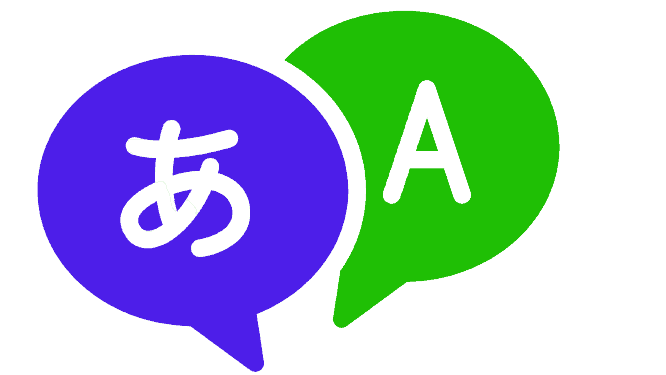Are you ready to unlock the doors to a new language? But the question is: which app should you choose to learn a language? Introducing the top two language learning competitors: Mondly and Memrise. Both applications are competing for your attention with their cutting-edge strategies and accessible user interfaces.
But don’t worry! We’re here to help you in making a thoughtful choice. Join us as we compare Mondly vs Memrise & evaluate each with their features, courses, technology and general approach to language learning. Let’s start the competition to see which app will be your ideal language partner.
Mondly vs Memrise- Quick Comparison

- Number of Languages: 41
- Free Trial (or free version): Yes
- Speech Recognition: Yes
- Avg. Lesson Length: 20 Minutes
- Pricing: Starts from $9.99
- Money Back Guarantee: 30 days
- Grammar Instruction: Average
- Live classes: No
- Progress Tracking: Yes
- Tests/Quizzes: Yes
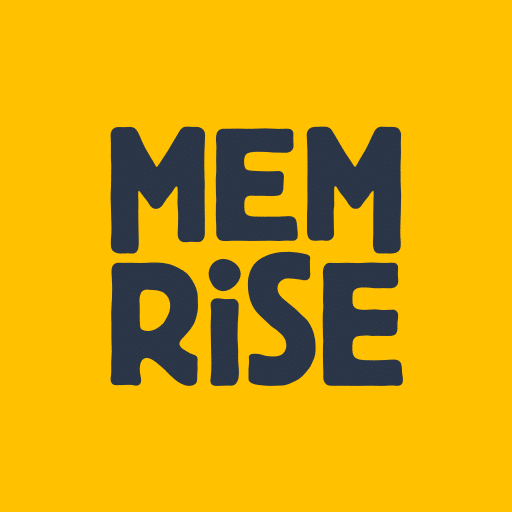
- Number of Languages: 23
- Free Trial (or free version): Yes
- Speech Recognition: Yes
- Avg. Lesson Length: 15 Minutes
- Pricing: Starts from $14.99
- Money Back Guarantee: 30 days
- Grammar Instruction: Not that much
- Live classes: No
- Progress Tracking: Yes
- Tests/Quizzes: Yes
Mondly Overview
The well-known language learning application Mondly provides a thorough method of language learning. Mondly promises to make language learning accessible and interesting for students of all levels with its slick and user-friendly design. There are many other languages available on the app, including well-known ones like English, Spanish, French, German, and many more.
In order to help users become more fluent in their vocabulary, grammar, pronunciation, and conversational abilities, Mondly provides a variety of interactive courses, exercises, and quizzes. With the help of the app’s voice recognition technology, users can practice speaking while getting immediate feedback.
One standout aspect of Mondly is its augmented reality (AR) lessons, which let users interact with computer-generated people and things in actual surroundings to further the immersive nature of language learning.
Additionally, Mondly provides a customized learning experience by adjusting to the user’s level of skill and rate of learning. The software keeps users motivated and involved throughout their language learning process by tracking progress, providing statistics, and recognizing accomplishments.
Mondly provides a free version with restricted access to features and is accessible for both iOS and Android smartphones. Users may subscribe to the premium version to access all languages and additional features.
My Mondly Experience
Mondly’s website claims that the app combines conversation-focused curriculum, speech recognition technology, and gamification. Many of you are aware with gamification in language learning programs, where you collect points, keep streaks, and compete on leaderboards. Similar thinking is used in Mondly, which may be quite inspiring for everyday practice. However, I feel that learning a language should include acknowledging errors and learning from them.
Let me now give you a brief explanation of how the program works. Mondly employs chatbot technology to practice communication and voice recognition to learn pronunciation. You can study from your local language, which is great since many language learning applications only allow English. 41 languages are available on Mondly for learning and studying. I learned Danish from Polish to test the app, which was intriguing.
Mondly has a free version, although it only offers a small amount of features. You can purchase a premium membership if you want access to more in-depth resources. The first few courses are accessible for free when you log onto the app, and there is a lot of information available if you unlock the premium features.
The program has a variety of games, such as word-to-image matches, translation drills, sentence construction drills, and word-highlighting with explanations. One feature I like is the conversation part, which uses speech recognition technology. You participate in the conversation, record your voice, and the software replays it so you can compare your pronunciation to that of a native speaker. This helps with pronunciation and speaking practice.
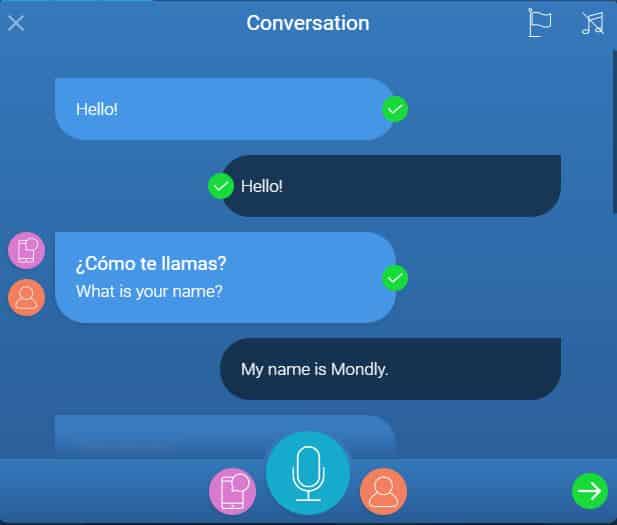
Now let’s discuss Mondly’s advantages. You can pick your beginning level without having to take a placement exam, which is a big plus. Being able to enter at the level that corresponds to your competence is handy. Mondly emphasizes learning phrases in context rather than simply individual words, which is another advantageous feature. This method has always worked better for me in terms of remembering new vocabulary and understanding how words are used in context.
It’s a lovely touch to provide both British English and American English as options for individuals studying English. Even if you’re proficient in English, learning from your favourite version may help. At the start, you may choose subjects you’re interested in and skip the others.
The replay capability for voice recognition exercises is one of the aspects that stands out to me. Unlike some other applications, Mondly plays back your recorded speech in addition to letting you know whether your pronunciation is right. This gives you the opportunity to hear your pronunciation and compare it to that of a native speaker, providing you with helpful feedback and assisting in the evaluation of your speaking abilities.
The range of swiping gestures in vocabulary exercises is another helpful feature. It makes learning more interesting and less boring by introducing an engaging factor. Mondly features a vocabulary practice to review what you’ve learned at the conclusion of each segment, which is useful for cementing the new words and expressions.
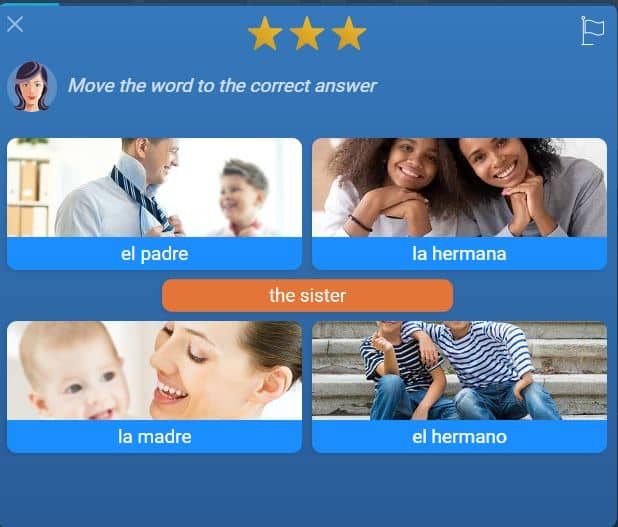
What are the disadvantages of Mondly? Let’s now talk about a few drawbacks I’ve experienced with the app. The inability to enroll in many languages at once is a disadvantage.
Another problem I had was that certain activities might be tough to move through because of pronunciation issues. It might be discouraging if the software incorrectly detects your pronunciation. It’s important to remember that voice recognition technology is still developing, so we may anticipate advancements in language learning applications in the future.
Last but not least, at first I found the app’s UI to be a little overwhelming and perplexing. It might be a little difficult to navigate through all the various sections and colors, particularly for first-time users. But eventually you grow accustomed to it and can concentrate on the information.
- Wide Language Selection: Mondly offers a vast range of 41 languages, providing learners with the opportunity to explore and study various languages of interest.
- Structured Curriculum: Mondly provides a structured curriculum that guides learners through progressive lessons, ensuring a systematic and organized approach to language learning.
- Thematic Learning: The app offers themed lessons that focus on practical vocabulary and phrases related to real-life situations, enhancing learners’ ability to communicate effectively in different contexts.
- Interactive and Visual Learning: Mondly incorporates interactive exercises, augmented reality features, and visually appealing graphics, making the learning experience engaging and enjoyable.
- Speech Recognition Technology: Mondly utilizes speech recognition technology to help learners improve their pronunciation by providing real-time feedback and corrections.
- Offline Learning: Mondly allows users to download lessons and study offline, providing flexibility and accessibility even without an internet connection.
- Affordable Lifetime Plan: Mondly offers a lifetime plan at a reasonable price, providing learners with access to all 41 languages. This can be a cost-effective option for individuals interested in long-term language learning.
- Limited Focus on Grammar: While Mondly covers essential grammar points, it may not provide an in-depth exploration of grammar rules and structures for learners who prefer a more grammar-focused approach.
- Limited Advanced Content: Mondly’s lessons may be more suitable for beginners and intermediate learners. Advanced learners might find the content somewhat limited in terms of complexity and depth.
- Less Community Interaction: Mondly’s platform emphasizes individual learning, which means it may offer fewer opportunities for community interaction and language practice compared to platforms with more community-oriented features.
Overall, Mondly blends cutting-edge technology, interesting material, and individualized learning to make language learning enjoyable and successful for students throughout the globe.
Memrise Overview
Memrise is a well-known language learning application which seeks to make learning a new language fun and engaging. It is attractive to learners of all ages and skill levels because to its user-friendly interface and intuitive design.
There are many other languages available on the app, including well-known ones like Spanish, French, Italian, Japanese, and many more. Users may browse a range of courses catered to various competency levels and learning objectives while choosing their target language.
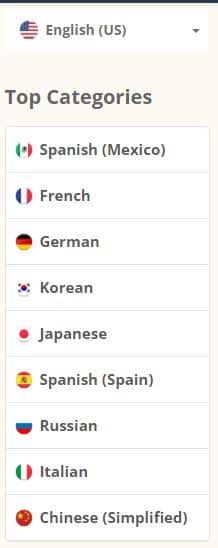
Memrise has a distinctive method of teaching languages that emphasizes mnemonics and spaced repetition. It uses interactive quizzes and flashcards to help users successfully recall words, phrases, and grammatical standards. Users may hone their listening and pronunciation abilities by using the app’s audio and visual components.
Memrise’s vibrant learning community is one of its unique qualities. Through language exchange relationships and chat forums, users can improve their conversational skills with native speakers. This social component gives the process of learning a language a dynamic and engaging element.
Additionally, Memrise provides gamification components like leaderboards, points, and badges to keep learners engaged and promote consistent practice. The software also offers individualized learning suggestions and progress monitoring depending on the user’s performance and areas for development.
Memrise provides a free version with restricted access to features and is accessible on both iOS and Android smartphones. A premium membership unlocks offline access, more interactive learning elements, and more material. It creates an engaging language learning environment by fusing cutting-edge learning methods, social interaction, and gamification.
My Memrise Experience
Learning with the locals is my favorite feature, and I’m referring especially about the pro version of the application. There is a feature in Memrise called “Learn with Locals” that lets you see videos of real people speaking the words and phrases you are learning in the app.
You’ve probably tried dozens of learning applications, and some of them feature artificial voices reading the language, which isn’t great. Additionally, some of the listening content in more conventional language learning materials is often very scripted and doesn’t seem particularly natural.
This feature of Memrise is cool because I don’t know how they produce the films, but it appears like they stop people on the street and ask them to say something. That has the advantage of sounding extremely authentic and genuine. Additionally, you get to hear from a variety of folks, including students, teenagers, and seniors. Listening to plenty of various ways to pronounce the same item can help you become acclimated to the language. In essence, it’s not robotic and it’s not programmed, so it basically encourages more organic learning on your part.

The “difficult words” aspect of Memorize is the second thing I truly enjoy about it. The “watering a plant” metaphor for learning vocabulary is there in the app’s free edition, which is something I particularly appreciate. When I used it to study Japanese, it was one of the things that truly inspired me. You essentially have this little plant symbol that grows if you do things well. You must water the plant if you haven’t updated the term in a while. The metaphor is thus really great.
In the paid version, you also get that plus the tough words function, which lets you employ spaced repetition to concentrate on certain words. This feature is pretty intriguing.
The capacity to work offline comes in third on my list. I’m passionate about productivity, and 5-minute language is about using the time you have to study languages. When I’m linked to Wi-Fi, I don’t have that much time to myself. I obviously don’t have a lot of time while I’m simply sitting at home using the Wi-Fi since I’m a working parent who runs a company. I love having something I can download and use on the train, aircraft, or other places without Wi-Fi.
- Extensive User-Generated Content: Memrise boasts a vast library of user-generated courses, providing learners with a wide range of learning materials and diverse content options.
- Vocabulary Acquisition Focus: Memrise places a strong emphasis on vocabulary acquisition, making it an ideal platform for learners looking to expand their vocabulary in their target language.
- Spaced Repetition System: Memrise utilizes a spaced repetition system that optimizes vocabulary retention by strategically spacing out review sessions, helping learners reinforce and retain learned words more effectively.
- Community Engagement: Memrise offers a vibrant community of language learners, allowing users to interact, share insights, and benefit from the collective knowledge and experiences of fellow learners.
- Multimedia Approach: Memrise incorporates multimedia elements, including audio, video, and images, to enhance the learning experience and cater to different learning preferences.
- Adaptive Learning: Memrise adapts to learners’ performance and progress, adjusting the difficulty and review intervals of vocabulary items to provide a personalized and tailored learning experience.
- Offline Learning: Memrise enables users to download courses and learn offline, providing flexibility and accessibility even without an internet connection.
- Limited Grammar Focus: Memrise’s primary focus is on vocabulary acquisition, which means it may not offer extensive grammar instruction for learners seeking a more comprehensive understanding of grammar rules and structures.
- Quality of User-Generated Content: While user-generated courses on Memrise can be valuable, the quality and accuracy of the content may vary since it is created by individual users. Learners need to exercise caution and carefully select reliable and well-reviewed courses.
- Pricing: Compared to some other language learning platforms, Memrise’s pricing plans may be relatively higher, particularly for the lifetime subscription option. This can be a consideration for learners on a tight budget.
Memrise & Mondly Detailed Comparison
1. User Interface and Experience
I can provide insights on the user interface and experience of both platforms since I am an enthusiastic language student who has explored both Mondly and Memrise.
Mondly welcomes you with a modern and simple user experience that makes navigating the site a joy. The app’s design is simple and well-organized, making it simple to access language lessons, courses, and features. The app’s design offers a flawless user experience, and the color palette is attractive to the eye. Lessons and activities are simple to go through, with detailed directions and engaging interactive features. The Mondly voice recognition technology performs effectively, giving precise feedback on pronunciation and assisting in the development of speaking abilities.
Memrise also has a user-friendly interface with a bright and colorful design. Your current courses and progress are shown on the app’s home screen, making it simple to follow your educational progress. The interactive quizzes provide a fun approach to review, and the flashcard-style presentation of vocabulary and phrases aids with memory. Language exchange partnerships and discussion forums make learning more social and immersive on Memrise.
Both Mondly and Memrise provide excellent overall user experiences in different ways. While Memrise’s vibrant design and active community involvement add to a fun and dynamic learning environment, Mondly’s interface is clean and polished, offering a more simplified experience.
Mondly provides a user-friendly and responsive web interface that replicates the app experience for these services’ online counterparts. Users can change between devices without losing their progress. However, when you use Mondly on web, it’s slightly sluggish & confusing at first glance. Memrise offers a similar cross-platform experience with a web version that matches the app’s design.
2. Language Course Selection
With a total of 41 languages available, Mondly stands out for its remarkable selection of language choices. Mondly has you covered whether you want to learn more about less often taught languages or are interested in popular languages like Spanish, French, or German. Because of the large number of languages available, students can pick a course that best suits their interests and learning objectives.
How many languages does Memrise offer? It provides a choice of 23 languages. It doesn’t have the same wide selection as Mondly, but it still covers a lot of common languages and offers a good starting point for language study. Even for free, you can select a lot of courses.
The typical class on Mondly lasts 20 minutes. This makes it possible to cover vocabulary, grammar, and conversation practice in more detail throughout each session. The somewhat longer session period gives students plenty of opportunity to explore the subtleties of the language and practice key ideas.
In contrast, the average lesson time on Memrise is 15 minutes. This shorter length is designed for students who have a limited amount of time to study or who prefer bite-sized learning sessions. It is simpler to incorporate language learning into a hectic schedule because of the condensed lesson format’s concentration on certain subjects. Lesson duration is flexible on both platforms, enabling students to choose the method that best meets their tastes and available time.
For every course you choose, Memrise displays a learning plan for you:
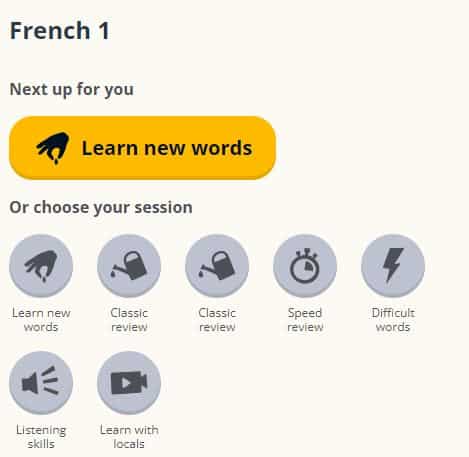
Both Mondly and Memrise provide distinctive features and methods to improve the experience of learning a language, in addition to the variety of language courses and typical session duration.
Mondly offers a broad variety of courses and activities as part of its all-encompassing approach to language learning. The topics covered here include vocabulary, grammar, listening comprehension, speaking practice, and cultural perspectives. But, for free users, there are not much content if you compare it with Memrise.
The application includes interactive features that let users practice speaking while getting immediate feedback, such as fill-in-the-blank activities, multiple-choice quizzes, and voice recognition technologies. Mondly also has lessons that use augmented reality (AR), where students can interact with virtual figures and items in real-world settings. This makes learning more engaging.
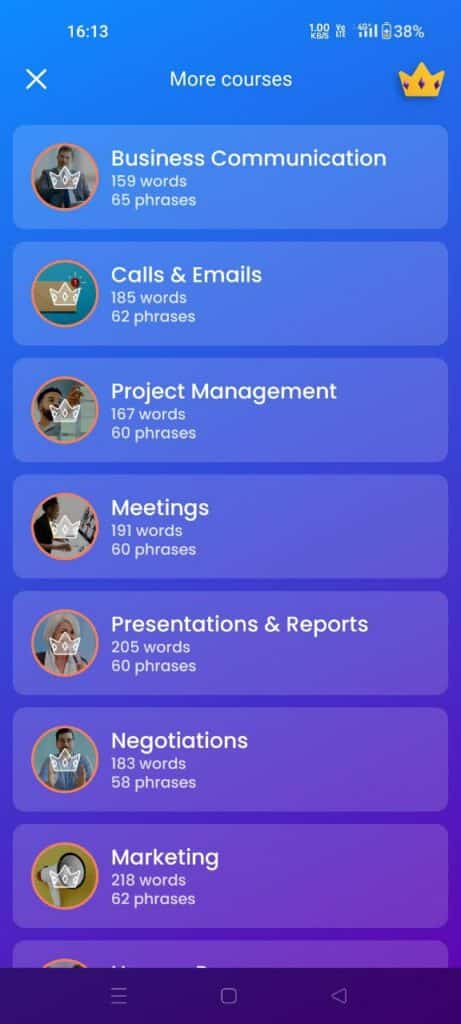
Memrise, focuses on memory retention and utilizes mnemonics to assist students efficiently retain words and phrases. The software uses spaced repetition to strengthen recall. Memory and recall are aided by Memrise’s flashcard-style presentation, which also includes captivating pictures and music. Memrise also promotes learner engagement with its community features, enabling users to communicate with native speakers and hone their conversational abilities in a safe setting.
Mondly and Memrise work hard to provide a variety of interesting resources for their language education curriculum. While Memrise combines user-generated material with expertly chosen courses, Mondly delivers a blend of professionally recorded audio, contextual dialogues, and real-world discussions. These methods ensure that consumers will have an engaging learning experience.
3. Learning Methods and Techniques
Mondly and Memrise use several methods and strategies for language acquisition, although they do it in different ways.
By using a variety of approaches and strategies, Mondly adopts a holistic approach to learning a new language. The program combines vocabulary development, grammatical drills, tasks for improving listening comprehension, and speaking practice.
Users can gain a wide variety of skills in their target language, thanks to these varied learning exercises. Mondly’s focus on conversational practice allows learners to apply their knowledge in genuine discussions and conversations. Additionally, the app makes use of voice recognition technology to provide users immediate feedback on their pronouncing in order to improve their speaking abilities.
Memrise emphasizes memory retention strategies heavily. The program makes use of spaced repetition, which evenly spaced information presentations to improve memory recall. With the use of mnemonic devices and Memrise’s flashcard-style presentation of vocabulary and phrases, students can more effectively retain their information. Regular review sessions help learners retain what they’ve learned. Memrise also uses audio and visual components to improve memory and make learning more interesting.
What I liked the most is their pronunciation videos appearing for every new word. You have the option to listen the said word from the short video or from the embedded audio clip. (These videos come from real human, not AI generated).

Both frameworks acknowledge the value of repetition and development. Interactive quizzes and activities are used by Mondly and Memrise to reinforce learning and gauge progress. Users can assess their understanding with these exercises, revisit key ideas, and monitor their progress over time. To encourage learners and foster a feeling of accomplishment, the two platforms also include gamification components like points, badges, and leaderboards.
It’s important to note that Memrise and Mondly both include adaptive learning tools. They modify the material and degree of difficulty in accordance with the learner’s development and competency. This individualized method makes sure that students are suitably challenged and might successfully build on their prior knowledge.
4. Gamification and Engagement
In order to inspire users and improve the overall learning experience, gamification and engagement are essential components of language learning applications. Let’s contrast the ways that Mondly and Memrise use gamification to increase engagement.
Gamification components are used by Mondly to keep students interested and motivated. Users of the program are rewarded for completing lectures, exercises, and challenges with points, badges, and virtual cash. These incentives provide users a feeling of accomplishment and motivate them to keep on with their language study.
In order to encourage competition and increase engagement, Mondly also includes a scoreboard where students may compare their development with that of others. You can see where you stand in your country, among your friends or globally. (Such customized leaderboard is not available in Memrise). The software also provides streaks and daily objectives, encouraging frequent practice and creating a feeling of continuity. Language learning is made more enjoyable and participatory by Mondly’s usage of gamification aspects.
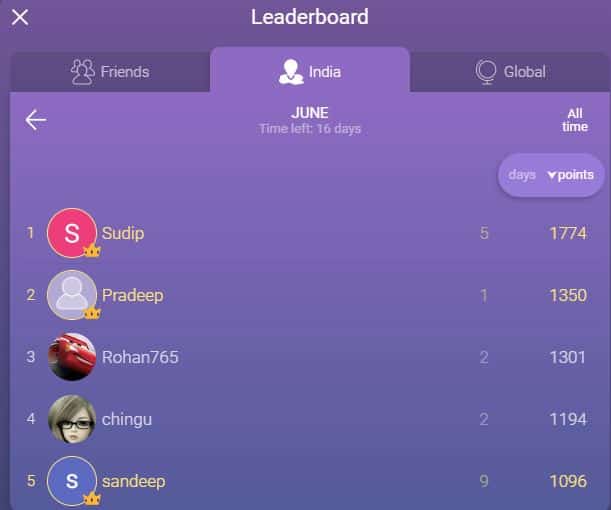
Gamification is another element that Memrise incorporates to create a fun learning experience. The app uses a points-based system where users advance through stages by earning points for right responses. In order to motivate users and acknowledge their efforts, Memrise employs a range of badges and awards.
Additionally, the app provides leaderboards so users can compare their performance with others. This promotes friendly rivalry and motivates students to work hard to become better. Language learning is made more enjoyable and engaging by Memrise’s gamified methodology.
Beyond gamification, Memrise and Mondly both recognize the value of interaction. With the use of augmented reality (AR) classes, students can interact with virtual people and things in actual environments using Mondly.
Language learning is made more exciting and engaging by this immersive experience. Memrise promotes community involvement by offering chat forums and language exchange partnerships. By interacting with native speakers and other language lovers, learners can create a friendly and engaging learning community.
5. Pronunciation Practice
Both Mondly and Memrise recognize the importance of pronunciation practice in language learning. Let’s compare how these platforms approach pronunciation practice.
Enhancing speech abilities is a priority for Mondly. The voice recognition technology used in the app enables users to practice speaking while getting immediate feedback on their pronounciation.
Mondly offers audio recordings of native speakers so that students can listen and imitate the proper accent. The program also has interactive pronunciation and intonation drills and conversations. Furthermore, Mondly’s augmented reality (AR) courses provide students a singular chance to practice pronouncing words in authentic situations, furthering the immersive language learning experience.
Additionally, Memrise provides resources and tasks to help students in honing their pronunciation. Learners can listen to and mimic the proper pronunciation in the app’s audio recordings of native speakers saying words and phrases.
The flashcard-style learning method used by Memrise promotes pronunciation by including audio cues for each vocabulary word. Additionally, Memrise encourages users to record their own voices and listen to them side by side with native speaker audio to enable self-evaluation and advancement.
Both apps acknowledge that acquiring proper pronunciation requires practice and feedback. Memrise delivers audio cues and possibilities for self-evaluation, while Mondly’s speech recognition technology provides rapid feedback on pronunciation correctness. Listening to native speakers on both platforms helps learners understand the target language’s pronunciation.
It’s important to note that although Mondly and Memrise both give pronunciation practice, Mondly’s significant use of voice recognition technology and augmented reality classes could offer learners seeking targeted pronunciation development a more immersive and engaging experience.
6. Progress Tracking and Analytics
Language learning applications must have progress monitoring and analytics since they provide users insights into their progress and help them pinpoint areas where they may improve. Let’s contrast how Memrise and Mondly tackle analytics and progress monitoring.
Mondly provides comprehensive statistics and progress monitoring tools that help users keep track of their language learning progress. The software offers thorough information on each activity’s duration, accuracy, and course completion.
Learners can follow their progress over time, keep track of their streaks, and check out the scoreboard to see how they stack up against other Mondly users. In order to help customers concentrate on areas that need development, Mondly additionally provides tailored learning insights and suggestions based on performance. These analytics tools provide students a clear picture of their progress and encourage them to keep on with their language studies.
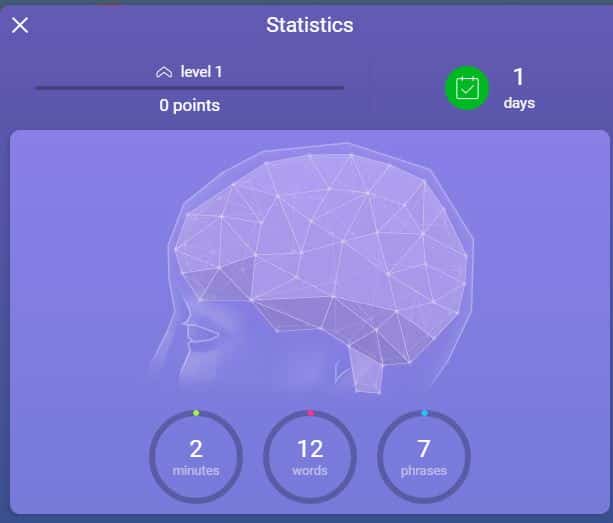
Memrise also includes analytics and progress monitoring that help students in determining their level of language competence. The software offers visual displays of progress, such as graphs and charts, to highlight academic successes over time. Users can examine previously completed classes, check their overall course progress, and keep tabs on their daily learning objectives.
Memrise delivers adaptive learning tools that modify the degree of difficulty in accordance with user performance, guaranteeing a tailored learning process. Additionally, the app offers alerts and reminders to assist users in maintaining their learning objectives. Memrise’s analytics and progress monitoring tools provide users a comprehensive picture of their language learning progress.
Also, Memrise would show you a leaderboard for every course. This shows your username, rank & all time-accumulated points. This create a sense of motivation among people who are committed to do their best in their language learning journey.
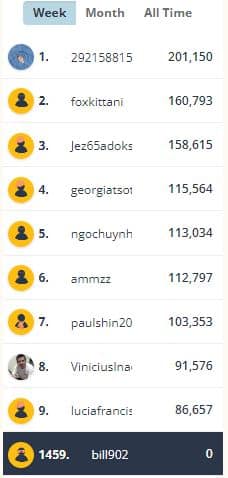
Both platforms provide students the ability to create objectives, monitor their progress, and access data. While Memrise’s analytics provide visual representations of progress and adaptive learning elements, Mondly’s analytics concentrate on overall performance, leaderboard rankings, and customized suggestions. Choosing between the two systems for progress monitoring and analytics may rely on your preferred metrics and visualizations.
7. Mobile App Features
When we are comparing Mondly and Memrise, we must judge their mobile applications. Mobile app features are crucial for language learning on the go. Let’s contrast the functions that Mondly and Memrise provide in their mobile applications.
The smartphone app from Mondly is brimming with tools that make learning languages easier. The software provides a broad selection of interactive vocabulary, grammar, listening comprehension, and speaking practice courses and activities. With the help of the voice recognition technology included into Mondly, users may practice pronouncing words and get immediate feedback.
The program also has augmented reality (AR) courses where users can interact with virtual people and things in actual environments, giving language learning a more immersive feel. Users may study whenever and wherever they choose thanks to Mondly’s mobile app, which offers offline access to classes and progress synchronization between devices. The app’s simple and straightforward user interface also makes navigation and lesson selection simple.
For language learners, Memrise’s mobile app offers a wide range of functions. To improve vocabulary, grammar, and listening abilities, the app provides a range of interactive activities and quizzes. Memrise uses a spaced repetition approach, which evenly spread information out to improve memory retention.
The software offers native speaker audio recordings that let users practice pronouncing words and enhance listening comprehension. Users of Memrise’s mobile app may study even without an internet connection thanks to the offline learning feature.
Additionally, the app provides community services like chat forums and language exchange partnerships that let users communicate with other users and native speakers. The mobile learning experience is further improved by Memrise’s user-friendly design and individualized learning suggestions. When you go to the chat section in Memrise app, you see various real-life situations where you have to deal in your target language. You can practice such scenarios in the app:
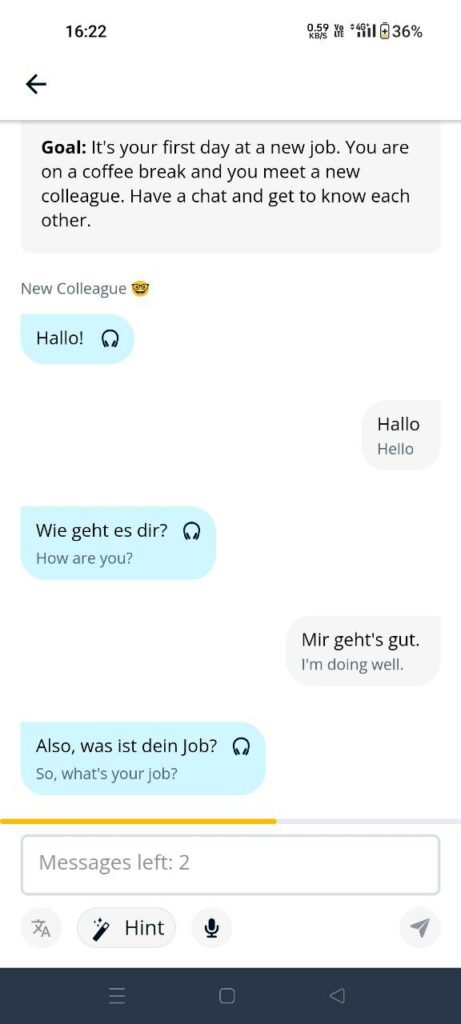
Through the features of their mobile apps, Mondly and Memrise place a strong emphasis on accessibility and convenience. Since both applications provide offline learning, users are able to study even when there is no internet connection. Additionally, they provide device progress synchronization, enabling users to continue their language-learning experience across several platforms without interruption.
8. Speech Recognition Technology
Speech recognition technology helps language learners practise speaking and obtain pronunciation feedback. Let’s contrast the voice recognition technologies used by Mondly and Memrise in their respective platforms.
Speech recognition technology is included by Mondly into their language learning app to help students in speaking more clearly and fluently. The app prompts users to repeat words, phrases, and sentences so they can practise speaking. The voice recognition software on Mondly evaluates how the user pronounces words and gives immediate feedback on correctness.
With the help of this real-time feedback, students may recognise and fix any pronunciation mistakes, improving their public speaking abilities. Mondly offers an engaging and immersive language learning experience that includes voice recognition, enabling students to perfect their pronunciation with assurance.
The Memrise app also includes voice recognition technology to help students improve their spoken language abilities. Users are invited to talk and record their own voice, which is then compared to the audio of native speakers, and the app contains audio recordings made by native speakers. With the help of this function, students can assess their pronounciation and make any required corrections. Memrise’s voice recognition tool nevertheless gives users the chance to practise and assess their pronunciation abilities, even if it doesn’t provide real-time feedback as Mondly does.
It’s vital to remember that voice recognition technology’s efficacy might vary based on specific elements including pronunciation clarity, background noise, and the calibre of the device’s microphone. For best outcomes, students should talk clearly into their device while in a calm area.
9. Vocabulary Building Tools
Building a vocabulary is an essential part of learning a language, and Memrise and Mondly both provide resources to help students become more proficient wordsmiths. Let’s compare how these platforms approach vocabulary building.
Mondly offers a selection of vocabulary-building resources designed to help students in growing their word banks. Thematic courses and categories are available on the app, enabling users to learn language in context. Learners may practise memorising and recall with the use of interactive flashcards that offer new words and phrases on Mondly.
The programme also has native speaker audio recordings, ensuring that students acquire proper pronunciation while picking up new vocabulary. Additionally, the gamified methodology used by Mondly encourages students via points, badges, and leaderboards, fostering an enjoyable atmosphere for vocabulary development.
Memrise’s unique methodology focuses on vocabulary development. With the use of spaced repetition, which presents words at predetermined intervals, the app improves memory retention.
Memrise has a large library of user-generated courses that let students study a broad variety of vocabulary suited to their hobbies or particular language objectives. Flashcards and multiple-choice tests are used in the app to encourage vocabulary acquisition. Memrise’s community features let users share and develop their own mnemonic devices, which improves vocabulary learning and memory recall.
The two platforms provide tools to help users learn new words, but their methods are different. In order to keep students interested, Mondly emphasises vocabulary within the framework of subject lectures and uses gamification. Memrise focuses on user-generated material, spaced repetition, and mnemonic devices to improve vocabulary learning.
10. Offline Learning Options
For language learners who prefer to study offline or have limited internet access, offline learning options are useful. Let’s contrast the offline learning possibilities offered by Mondly and Memrise.
In its language learning app, Mondly provides offline learning options. Lessons, vocabulary lists, and other learning resources may all be downloaded by users for offline access to their devices. When you go to Settings->Download in Mondly app, you see the various downloadable resources available to use without internet:
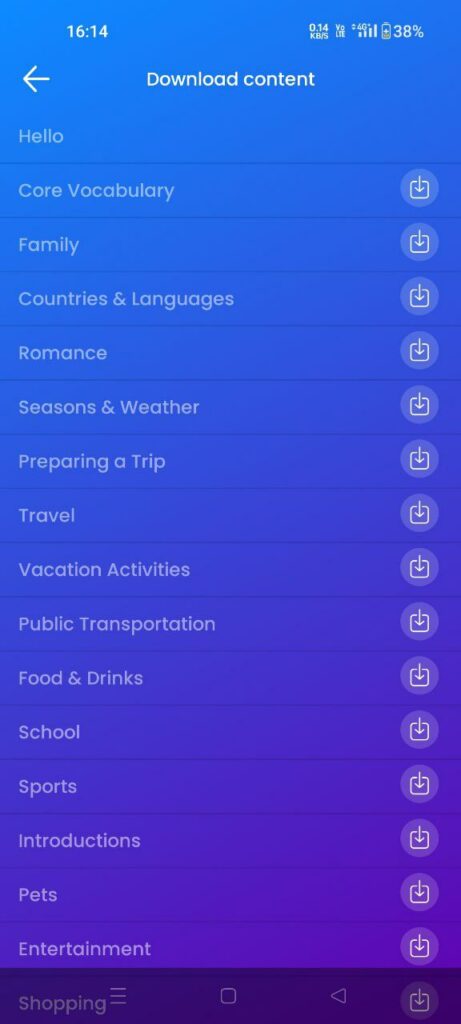
With the help of this tool, students can continue on learning even when there is no internet connection. With Mondly’s offline mode, users may study on the move without relying on a steady internet connection, such as during commuting or when travelling. After downloading the materials, students can return to the courses at any time and practise their language abilities without being connected to the internet.
Memrise offers customers offline learning choices in a similar way. Students can learn offline by downloading courses, lessons, and vocabulary lists. For students who desire to continue their education in settings where internet connectivity may be restricted or nonexistent, this option is very helpful.
With Memrise’s offline mode, students may access their downloaded material, review vocabulary, and do assignments without an internet connection, providing a smooth learning experience.
So, Mondly or Memrise whatever you choose, both recognise the value of offline learning and provide options for students who prefer or must study offline. Both platforms meet their users’ various learning requirements and situations by allowing them to download and view learning materials offline.
11. Personalized Learning and Adaptive Algorithms
Language learning applications must include personalised learning and adaptable algorithms to meet each student’s requirements. Let’s contrast how the platforms of Mondly and Memrise use personalised learning and adaptive algorithms.
Mondly offers a personalised approach to language learning via the use of personalised learning approaches. The software adjusts to the objectives, learning preferences, and competence levels of the user. The adaptive algorithms used by Mondly monitor students’ development and performance while identifying their strengths and limitations.
Mondly provides individualised suggestions for courses and exercises that focus on certain areas for growth based on this research. Within the app, users can choose objectives and preferences, which enables Mondly to curate material that fits each user’s specific learning requirements. This individualised method makes sure that students get specialised teaching and practise, which improves their language learning process.
To provide individualised learning opportunities, Memrise also uses adaptive algorithms. The app monitors students’ development and use spaced repetition methods to maximise language retention.
Memrise customises vocabulary presentation depending on performance and memory recall of individual students. To promote successful learning, the platform modifies the intervals at which words are examined. With the help of Memrise’s adaptive algorithms, students may concentrate on the concepts they need to practise the most to maximise recall.
To meet the particular requirements of learners and enhance their language learning experience, both Mondly and Memrise use personalised learning and adaptive algorithms. By analysing learners’ progress, strengths, and weaknesses, these systems provide personalised suggestions and adjust material to learning styles. This personalised method lets learners grow at their own speed and concentrate on areas that need more attention.
12. Translations
In language learning applications, translations are crucial since they aid students in comprehending and making sense of unfamiliar words and phrases. Let’s contrast how Memrise and Mondly manage translations on their respective platforms.
Translations are a crucial component of Mondly’s language learning process. In different circumstances, the app provides translations of vocabulary words, phrases, and sentences. To help them grasp the purpose and application of new language components, learners can use translations alongside the target language material.
Mondly uses native speakers’ text and audio translations to help users pronounce and utilise words correctly. While translations are useful for understanding, it’s crucial to remember that an undue dependence on them could hinder learners’ capacity to build fluency and think flexibly in the target language.
Memrise also offers translations to help students grasp foreign words and expressions. The text-based translations offered by the app help learners rapidly understand the meaning of vocabulary words. Translations are often provided alongside the material in the target language to help learners connect the dots and deepen their knowledge. As with Mondly, learners should try to think and speak in the target language rather than relying on translations.
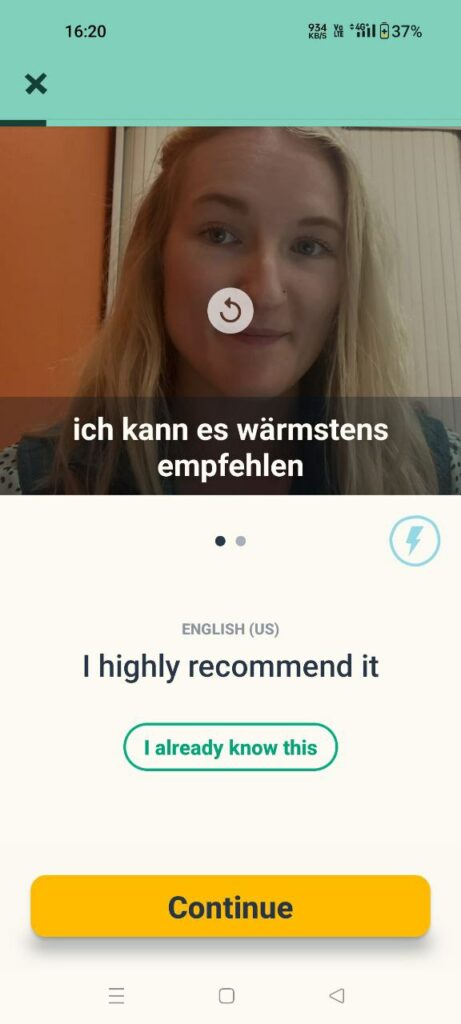
It’s important to note that Memrise and Mondly both stress the value of contextual learning and actual language use. Through interactive activities, conversations, and audio recordings made by native speakers, they allow students to interact with the target language and get a deeper grasp of its use than they would otherwise.
13. Customer Support
Customer service is a crucial component of language learning applications since it ensures that customers have a dependable avenue to voice their complaints and get help when required. Let’s analyse the customer service tactics used by Mondly and Memrise.
To help consumers with their questions and problems, Mondly provides customer assistance via a number of channels. The site has a support section where users can search for solutions to common issues and discover answers to commonly asked concerns.
But, Mondly doesn’t have email help for more specialised questions or technical issues. Users have the option to fill the web-form at the contact page. Users can reach the Mondly support staff and anticipate a prompt response. Customer service at Mondly attempts to respond to user inquiries quickly and provide beneficial solutions to promote a positive learning experience.
Memrise also has customer service to help users with questions and problems. The platform has a thorough help section that addresses a variety of subjects, such as account administration, technical problems, and commonly asked questions.
Users may browse the help center’s articles to discover the solutions to their questions. Additionally, Memrise offers a contact form for customers to send specific questions or concerns to the support staff. Memrise works hard to respond to user questions promptly, even if the response time may vary.
14. Pricing & Plans
| Language Learning App | 1 Month Price | 12 Months Price | Lifetime Price |
|---|---|---|---|
| Mondly | $9.99 (1 Language) | $47.99 (1 Language) | $89.99 (41 languages) |
| Memrise | $14.99 (23 languages) | $44.99 (23 languages) | $199.99 (23 languages) |
Mondly often has more affordable subscription prices than Memrise, especially for the 1-month and 12-month programs. But, Mondly will give you the access to only one language with these plans. On the other hand, you get access to all the 23 languages if you choose any Memrise plan.
How much does Mondly cost? Mondly’s lifetime package, which costs $89.99, gives learners access to all 41 languages for long-term study. Memrise, provides a lifetime subscription for $199.99, which is more expensive but gives you access to 23 languages. While more expensive, Memrise may be better for learners who want to study a particular selection of languages. If you don’t like, you are always free to cancel your memrise plan & get full refund.
Key Differences between Mondly & Memrise
Although Memrise and Mondly are both well-known language learning applications, they vary significantly in several important ways. The key differences between the two are as follows:
- Language Selection: Mondly offers a wide range of language options, with 41 languages available for learning. On the other hand, Memrise offers access to 23 different languages. Before choosing a platform, verify their language options if you want a language not offered by both.
- Learning Approach: To aid students in developing their different language abilities, Mondly focuses on offering scheduled courses and subject material. It includes interactive conversations, vocabulary drills, and grammar drills. Memrise, on the other hand, has a distinctive strategy that places a significant focus on vocabulary learning via spaced repetition and user-generated material.
- Gamification and engagement: Although gamification aspects are used by both platforms to increase user engagement, their execution and individual features vary. Mondly uses leaderboards, points, and awards to encourage learners, but Memrise takes a more community-focused approach by letting users share and construct their own mnemonic devices and interact with other users.
- Offline Learning: Mondly and Memrise allow students to download lessons and study without an internet connection. However, each platform’s offline learning features and limits could vary.
- Pricing: Is Mondly completely free? Not really, but compared to Memrise, Mondly often has cheaper membership costs, especially for the 1-month and 12-month plans. Additionally, Memrise’s lifetime subscription is more costly and only covers 23 languages, while Mondly’s lifetime plan allows access to all 41 languages. Based on your language learning objectives, assess the programs’ pricing and value.
How Mondly is Better (& for whom)?
Mondly is best suited for language learners that appreciate a broad variety of language alternatives and prefer an organized approach to language learning. The following characteristics make Mondly an attractive option for certain students:
- Beginners: Mondly provides thorough classes designed to walk new language learners through the basics. Learners get a solid foundation in vocabulary, grammar, and pronunciation thanks to the planned curriculum and concise explanations.
- Multi-Language Learners: With 41 languages accessible for learning, Mondly stands out for its broad language choices. This makes it the perfect platform for students who are curious in learning many languages or who have a preference for less often taught languages.
- Thematic Learning: Mondly arranges its classes according to predetermined topics, such as business, travel, or everyday living. This method teaches vocabulary and linguistic skills that can be used in real life, making it a good alternative for those who need to speak in certain scenarios.
- Visual and Interactive Learners: To improve the learning experience, Mondly uses aesthetically attractive visuals, interactive activities, and augmented reality capabilities. This is for students who benefit from visual cues and interactive features to increase engagement and understanding.
- Structured Progression: Mondly offers a learning route that is organized into lessons that are taught in order and become harder gradually. This methodical approach ensures that students can track their development as they go through the language levels and can follow a defined trajectory.
How Memrise is Better (& for whom)?
Is Memrise a good language app? If yes, for whom? Memrise is ideal for language learners who place a high priority on vocabulary development, appreciate user-generated material, and value social interaction. The following are the main characteristics that make Memrise a great option for certain learners:
- Vocabulary-focused Learners: Memrise strongly emphasizes the growth of vocabulary. The portal provides access to a large collection of user-generated courses that concentrate on increasing and diversifying vocabulary across many languages. Memrise offers a plethora of user-generated information that can help your study if you want to quickly increase your vocabulary.
- Spaced Repetition Enthusiasts: Memrise utilizes spaced repetition techniques to optimize vocabulary retention. Based on each learner’s success, the app’s adaptive algorithm modifies the intervals between word reviews. This method improves word retention and memorization.
- Community-driven Students: Memrise features a thriving community feature that lets people build and share their own courses. User-generated content offers varied learning resources and lets language lovers share their expertise and experiences. Memrise provides a vibrant platform for interaction if you appreciate participating in local communities and team-based learning.
- Visual and Mnemonic Learners: Memrise uses mnemonic techniques like memorable imagery and creative associations to help vocabulary retention. Memrise’s method will help improve vocabulary word learning and recall for visual learners and those who like mnemonic devices.
- Adaptive Learning Preferences: Memrise adjusts vocabulary presentation based on learners’ performance and progress. The adaptive algorithms help pupils concentrate on areas that need more practice, making learning efficient and individualized.
Mondly Testonomials
Language learners who value Mondly’s capacity to build actual fluency have given it excellent ratings. The software has three user levels—beginning, mid, and advanced—to ensure that learners of various competence levels have a customized learning experience.
Users like the diversity of exercises and feedback given, which enables thorough language training. The most well-liked of the recent improvements, the hands-free function was praised for being cutting-edge and engaging.
One customer cited picking Mondly precisely because it included Finnish, which was hard to discover in other language learning applications. They like Mondly’s advertising since they are non-intrusive and only serve to improve the program itself, even if they also use Duolingo.
The learning method employed by Mondly has garnered praise from users who have been using the app for well over a year. The memory matching activities, which include word spellings, pronunciations, and visuals, make learning enjoyable and effective. The software also gives users the option to choose texts in their native language, their target language, or even another language for multilingual practice, making learning more engaging.
Overall, customers heartily endorse Mondly for its successful teaching methodology, fun activities, and capacity to tailor the learning environment to each user’s tastes.
Memrise Testonomials
Users have given Memrise favorable reviews, praising its user-friendly design and the audiovisual component of the learning process. The words and phrases that users are learning are enjoyable for them to hear and witness spoken by other individuals. However, some users have offered suggestions for enhancements, such as ensuring uniform speaker volume levels and integrating the many app parts into a single interface for simplicity.
Memrise is well-known for its extensive selection of languages that can be learned as well as the opportunity to turn off adverts and access paid material. Users report that adverts occur after every few courses beyond the daily limit, although they become less invasive after they develop a learning rhythm. Memrise is one of the top language-learning applications, according to users.
One user explicitly cites Memrise’s success in word recognition, but also mentions the difficulty in recalling words without cues, especially while learning Spanish. Despite attributing it to their particular learning difficulties, many indicate a wish for Memrise to provide assistance in getting over this obstacle. In addition, consumers praise the app’s excellent user interface.
In summary, Memrise is complimented for its approachable design, audiovisual learning environment, wide range of language choices, and the choice to turn off adverts. Users like the app’s word recognition capabilities and feel that the user experience is outstanding overall.
Memrise vs Mondly- Summary
Mondly
Total Languages: 41
Starts from: $9.99
Progress tracking
30 days money back guarantee
What did We like?
Mondly will take you on the ultimate language learning adventure. It’s planned courses, theme learning, and 41 languages make language learning fun and effective. Examine actual situations, improve your pronunciation using voice recognition technology, and take use of interactive workouts and attractive visuals. Mondly’s cheap lifetime package allows multi-language learners access to all 41 languages. Unlock your language potential and go on a language journey. With Mondly, you may begin your language adventure right now and explore a world of opportunities.
- Wide Language Selection
- Structured Curriculum
- Thematic Learning
- Interactive and Visual Learning
- Speech Recognition Technology
- Offline Learning
- Affordable Lifetime Plan
- Limited Focus on Grammar
- Limited Advanced Content
- Less Community Interaction
Memrise
Total Languages: 23
Starts from: $14.99
Tests & Quizzes
30 days money back guarantee
What did We like?
With Memrise, you can open up a world of language expertise. Immerse yourself in a sizable collection of user-generated material that is geared toward vocabulary development and is supported by a thriving learning community. Take advantage of a technique of spaced repetition that enhances learning experiences and memory retention. Memrise is a fun and interactive environment with multimedia components and adaptive learning. Increase your vocabulary, interact with other students, and set off on a memorable language adventure. Start your language journey right now and use Memrise to learn a language like never before.
- Extensive User-Generated Content
- Vocabulary Acquisition Focus
- Spaced Repetition System
- Community Engagement
- Multimedia Approach
- Adaptive Learning
- Offline Learning
- Limited Grammar Focus
- Quality of User-Generated Content
- Pricing
FAQs
The choice between Memrise and Mondly depends on your personal preferences and learning goals. Both apps offer unique features and approaches to language learning. Consider factors such as language selection, teaching methods, and pricing to determine which app aligns better with your needs.
Mondly offers a free version with limited access to its features and lessons. However, to unlock the full potential of the app and access all languages and features, a paid subscription is required.
Memrise is known for its focus on vocabulary acquisition and its use of spaced repetition techniques. Many users find Memrise effective in expanding their vocabulary and improving their retention of learned words. However, language learning outcomes vary depending on individual effort, consistency, and the overall approach to language learning.
Memrise offers a free version that provides access to some of its features and content. However, to access the full range of courses, features, and offline learning, a paid subscription called Memrise Pro is available.
Memrise is a valuable tool for language learning, but achieving fluency requires consistent practice, exposure to the language in various contexts, and a well-rounded language learning approach. Memrise can significantly contribute to vocabulary acquisition and overall language proficiency, but it is just one component of the language learning journey.

Meet Bill, a French language teacher and blogger who specializes in testing various language learning apps. He has been teaching French for nearly 4 decades and holds a Bachelor’s degree from Manhattanville College. With a passion for technology and how it can enhance language learning, Bill has spent years testing and reviewing different language learning platforms. His blog provides valuable insights into the pros and cons of each app, as well as tips for language learners of all levels.
